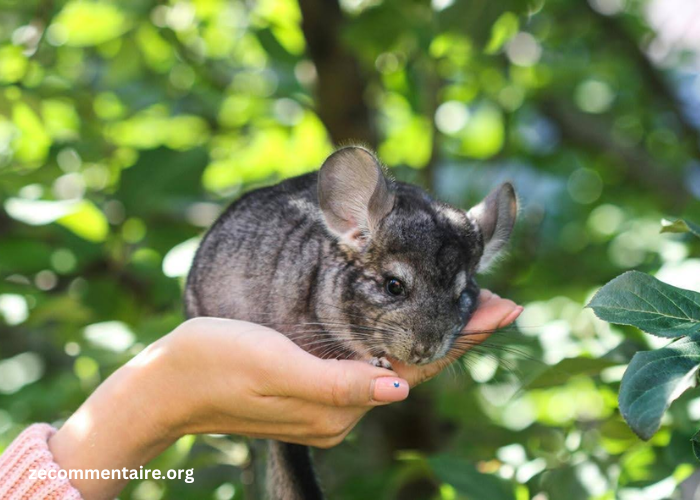Welcome to the ultimate resource for baby chinchilla care! Chinchillas are adorable, playful, and sensitive exotic pets that require special attention and care. This is especially true when they’re young.
This comprehensive guide is designed to help you master the art of caring for a baby chinchilla. We’ll help you ensure that your furry friend remains healthy and happy.
Let’s begin!
Create a Safe and Comfortable Habitat
Before bringing home your new baby chinchilla, it’s important to create a safe and comfortable habitat for them to live in. Chinchillas are active animals that need plenty of space to run, jump, and play. A good rule of thumb is to have at least 2 square feet of space per chinchilla.
To create the perfect habitat, you’ll need a large wire cage with multiple levels and platforms. This will give your chinchilla ample space to explore and exercise. Make sure to also provide plenty of hiding spots and chew toys for them to play with.
It’s also important to line the cage with a soft material such as fleece or aspen bedding. Avoid using cedar or pine shavings as they can be harmful to your chinchilla’s respiratory system.
Maintain Ideal Temperature and Humidity Levels
Chinchillas are native to the Andes Mountains, which means they are used to cooler temperatures. Their ideal temperature range is between 60-70 degrees Fahrenheit. It’s important to keep them out of direct sunlight and away from drafts.
Humidity levels are also crucial for chinchillas as they can easily develop respiratory problems in high-humidity environments. The ideal humidity level for chinchillas is between 40-50%. You can use a hygrometer to monitor the humidity levels in your chinchilla’s habitat.
Provide a Balanced Diet
A well-balanced diet is essential for the health and well-being of your baby chinchilla. Their diet should consist of high-quality hay, such as Timothy or orchard grass, as well as chinchilla pellets and fresh vegetables.
It’s important to avoid feeding your chinchilla sugary or fatty foods, as these can lead to health problems such as obesity and dental issues. Treats should only be given in moderation and should be specifically made for chinchillas.
Ensure Proper Handling and Socialization
Chinchillas are social animals and require regular handling and interaction with their owners. However, it’s important to handle them correctly to avoid injuries or stress.
Holding a chinchilla by the base of their tail can cause serious harm, as their tails are not designed to support their weight. Instead, place one hand under their chest and one hand supporting their hindquarters.
When picking up your chinchilla, always support their bottom and back legs. Avoid grabbing them by the tail as this can cause serious harm. It’s also important to provide your chinchilla with a safe and quiet space to retreat to when they feel overwhelmed.
Offer Chew Toys and Safe Enrichment Activities
Chinchillas have constantly growing teeth and need to chew on things to keep them in check. Providing plenty of safe chew toys and wooden blocks for your chinchilla will not only keep their teeth healthy but also provide mental stimulation.
You can also offer enrichment activities such as hiding treats around their habitat or setting up an obstacle course for them to play in. This will keep your chinchilla entertained and engaged, preventing boredom and destructive behavior.
Any baby animal care entails playtime, patience, and love. So, make sure to spend quality time with your chinchilla every day. This will not only strengthen your bond but also improve their overall well-being.
Regular Veterinary Check-ups
Just like any other pet, it’s important to take your chinchilla for regular check-ups with a specialized exotic animal veterinarian. They can help ensure that your chinchilla is in good health and catch any potential issues early on.
It’s also important to keep up with their vaccinations and parasite prevention treatments. Your vet will be able to advise you on the best schedule for your chinchilla’s specific needs.
Dust Baths for Fur Maintenance
Chinchillas have thick, soft fur that requires regular maintenance. In their natural habitat, they take dust baths to keep their fur clean and healthy. You can provide a special chinchilla dust bath for your pet by filling a shallow container with chinchilla dust and letting them roll around in it.
It’s important to offer a dust bath at least twice a week to help your chinchilla maintain their fur and prevent any skin problems. This is also a great way for them to release excess energy and have fun.
Monitor and Trim Nails
Just like humans, chinchillas’ nails can also grow too long and require trimming. Providing appropriate surfaces for your chinchilla to run and play on can help naturally wear down their nails, but it’s important to regularly check and trim them if needed.
If you’re not comfortable trimming your chinchilla’s nails yourself, seek the help of a professional veterinarian or groomer who is experienced in handling exotic animals. This will ensure that your chinchilla’s nails are trimmed safely and correctly.
Safe Playtime Outside the Cage
Chinchillas can also benefit from supervised playtime outside of their cage. This will not only give them a change of scenery but also allow them to explore and exercise even more.
It’s important to chinchilla-proof the room before letting them out, as they can be quite mischievous and curious creatures. Cover any exposed wires or sharp edges, and make sure there are no small spaces where they can get stuck. Supervise them at all times and provide a safe playpen for them to roam around in.
Recognize Signs of Stress and Address Them
Just like any other animal, chinchillas can experience stress and anxiety. It’s important to recognize the signs of stress in your chinchilla, such as excessive hiding or aggressive behavior, and address them accordingly.
Providing a calm and consistent environment, regular handling and socialization, and plenty of mental stimulation can help reduce stress in your baby chinchilla. This will not only keep them happy and healthy but also help strengthen your bond with them.
Learn How to Care for a Baby Chinchilla
Caring for a baby chinchilla requires dedication, patience, and proper knowledge. By following the tips and guidelines in this resource, you’ll be well-equipped to provide your furry friend with a safe and loving home.
Remember to always prioritize their safety and well-being by creating a suitable habitat. Monitor their temperature, nutrition, and health regularly. Provide appropriate enrichment activities and handle them with care.
With the right care and attention, your baby chinchilla will thrive under your loving care.
Should you wish to explore other topics, head to our main blog page.






